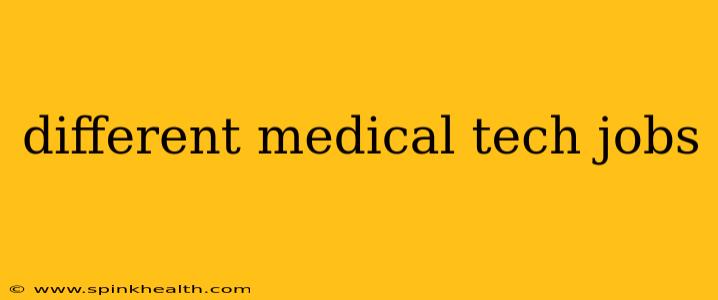A World of Wonders: Exploring the Diverse Landscape of Medical Technology Jobs
The world of medical technology is booming, a vibrant tapestry woven from innovation, compassion, and cutting-edge science. It's not just about the gleaming robots and futuristic imaging devices; it's about the dedicated individuals who design, build, maintain, and utilize these tools to improve and save lives. This journey explores the fascinating diversity of medical technology jobs, revealing opportunities for people from a wide range of backgrounds and skill sets.
Imagine a world without the precise imaging of an MRI, the life-saving precision of a robotic surgical system, or the constant monitoring of a patient's vital signs through smart wearables. These marvels are only possible because of the tireless work and dedication of professionals in medical technology. Let’s delve into some of the many exciting career paths:
What are some examples of jobs in medical technology?
This is a question that opens a floodgate of possibilities. From the highly technical to the deeply empathetic, medical technology needs a diverse team. Here are a few examples, touching upon different skillsets and specializations:
-
Biomedical Engineer: These ingenious individuals are the architects of medical devices. They design, develop, test, and evaluate everything from pacemakers to artificial joints. Their work requires a deep understanding of biology, engineering principles, and regulatory compliance.
-
Medical Device Technician: These technicians are the unsung heroes who ensure that complex medical equipment functions flawlessly. They perform preventative maintenance, troubleshoot malfunctions, and repair or replace damaged components. Their expertise is critical for the safe and efficient operation of hospitals and clinics.
-
Clinical Engineer: Bridging the gap between engineering and medicine, clinical engineers focus on the application and maintenance of medical devices within healthcare settings. They work closely with clinicians to optimize equipment use and improve patient care.
-
Radiologic Technologist: These professionals operate sophisticated imaging equipment, such as X-ray machines, CT scanners, and MRI machines, producing high-quality images that aid in diagnosis. They require a keen eye for detail and a commitment to patient safety.
-
Healthcare Informatics Specialist: In today's digital age, managing and analyzing healthcare data is paramount. These specialists design, implement, and maintain electronic health record (EHR) systems, ensuring data security and integrity. They use their expertise to improve the efficiency and effectiveness of healthcare organizations.
-
Medical Software Developer: The software powering medical devices and healthcare systems is complex and critical. Developers create, maintain, and improve the software that drives everything from diagnostic tools to hospital management systems.
What are the different types of medical technology?
The field of medical technology encompasses a vast array of specialties, each with its own unique challenges and rewards. This includes:
-
Diagnostic Imaging: This involves the use of technologies like X-rays, CT scans, MRI, and ultrasound to create detailed images of the body's internal structures, assisting in the diagnosis of various diseases and conditions.
-
Medical Devices: This broad category includes a wide range of devices used for diagnosis, treatment, and monitoring, such as pacemakers, artificial joints, surgical robots, and insulin pumps.
-
Biomedical Instrumentation: This area focuses on the design and development of instruments and equipment used to measure and monitor physiological signals, such as heart rate, blood pressure, and brain activity.
-
Biomaterials: This field deals with the development and application of materials used in medical devices and implants, ensuring biocompatibility and long-term functionality.
-
Telemedicine: The use of technology to deliver healthcare services remotely, such as virtual consultations and remote patient monitoring.
What qualifications do you need for a medical technology job?
The qualifications needed for a medical technology job vary greatly depending on the specific role. However, most positions require a strong foundation in science and technology, with many requiring a bachelor's or master's degree in a relevant field such as biomedical engineering, computer science, or healthcare informatics.
How much do medical technology jobs pay?
Salaries in medical technology are competitive and often reflect the high level of skill and expertise required. Factors influencing salary include experience, education, location, and specific role. It's a field offering promising financial rewards along with the gratification of contributing to improved healthcare outcomes.
The future of medical technology is bright, promising even more innovation and opportunities. Whether you're drawn to the intricacies of engineering, the precision of clinical practice, or the power of data analysis, this dynamic field offers a diverse and rewarding career path for those passionate about advancing healthcare.

